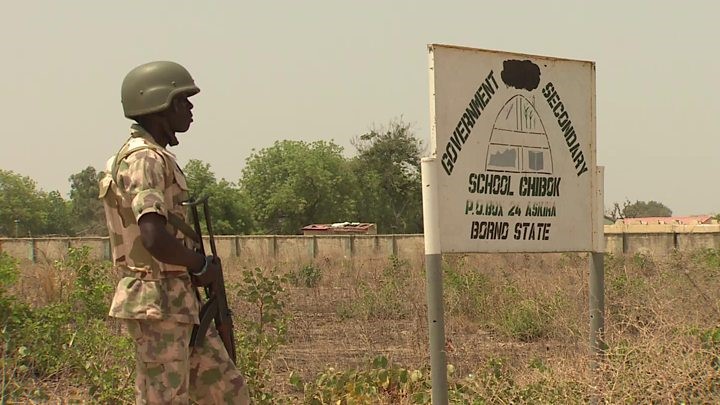Chibok Grapples With Infrastructural Deficit, Terrorist Attacks Amid Pandemic
Hundreds of residents have been displaced through the activities of Boko Haram as they fear increased food insecurity and vulnerability to COVID-19.

Over six years after Chibok in Borno State was hit by one of the worst cases of terrorist abduction in recent Nigerian history, the town has still not recovered as it grapples with the twin evil of occasional terrorist attacks and insufficient basic amenities.
In April 2014, members of the terror group, Boko Haram, had invaded the Government Secondary School, Chibok, and abducted 276 children, 57 of which escaped that night by jumping off trucks into nearby bushes. The girls, many of whom were from surrounding communities, had camped in the school to take external examinations.
Houses in Chibok were burnt down during the attack and the school itself has since deteriorated and is in need of repairs.
The Kibaku (Chibok) Area Development Association (KADA) in a statement released earlier in July said the structures in the school are abandoned even though there have been commitments from various groups to rebuild them.
“The Corps of Nigerian Army Engineers began work on it but abandoned it and it remains uncompleted to this day,” the association said.
Because of the school’s poor condition, students are forced to receive only afternoon lessons at a nearby primary school after it closes every day.
In an interview with HumAngle, KADA’s Director of Media and Publicity, Dr Manasseh Allen, noted that academic activities at the primary school have also ceased as a result of the COVID-19 pandemic.
GSS Chibok is the only senior secondary school serving Chibok and neighbouring communities and since its destruction, final-year students have had to go to Maiduguri, the state capital, to write ordinary level examinations.
No COVID-19 support
The IDPs living in the host community fend for themselves, Dr Allen said as he described the condition of the inhabitants, and even though Chibok has an estimated population of 65,000, there is only one functional health facility “with no doctor, only nurses and some other health workers”.
“The only COVID-19 equipment taken to Chibok are thermometres and a few disinfectants, no Personal Protective Equipment or any advanced equipment according to the workers there,” he added.
Repeated attacks
Dr Allen said Chibok is the only Local Government Area where people are not staying at camps established for Internally Displaced Persons (IDPs) because of the lack of security.
“Kibaku people displaced from Damboa have been hosted successfully by Chibok in the 20 housing units on Mifa road and all vacant houses in the town have been opened to accommodate all displaced people from hard-hit areas around the local government area,” he said.
He said villages in Chibok, such as Kautikari, Kuburmbula, Ntsiha, Gatamwarwa, Kwaranglum, Bwalakila, Kaumutahyahi, Piyemi, Makala, have faced repeated attacks. But in spite of the challenges, the residents “refused to relocate or abandon their homes”.
“Right now farmers are daily being attacked from their farms. Many have been killed in Kuburmbula and Kautikari and there have been dozens of unreported abductions in Mbulabam and Kautikari. Chibok is one of resilient LGAs that defies Boko Haram attacks.”
Dr Allen, however, fears that if the attacks continue unchecked, many of the farmers will be prevented from working.
Displaced people from the town have increased and a large number of them are relocating to neighbouring towns such as Maiduguri while others have travelled to Lagos, Yola, Abuja, and other places across the country.
“We have IDPs from 32 villages collapsed in Chibok town,” he also observed.
“IDPs from villages in Damboa, Askira, and even Gwoza are now staying in Chibok, especially those who don’t want to stay in IDP camps, like the Kibaku people. With persistent attacks on Kautikari and the dangers of going to farms, many are looking for a way out to relocate to where they could farm, which is their only source of livelihood.”
The KADA spokesperson said, surprisingly, there is no humanitarian hub in Chibok and the United Nations Population Fund (UNFPA) is the only multinational organisation with a few visible projects in the townㅡ“which,” he added, “look more of a waste of land than houses.”
A HumAngle investigation revealed that Chibok currently lies at an intersection of rivalry between the two main factions of Boko Haram and has suffered direct attacks from both groups, during which inhabitants and military personnel have been victims.
In January, terrorists attacked a village in Chibok, killed three people, and carted away valuables. The following month, another village, Korongilum, was attacked and many houses were set ablaze. But residents say there have been more attacks this year, many of which have escaped the pages of newspapers, and they look to the government to safeguard lives and properties while also caring for the victims of past attacks.
Support Our Journalism
There are millions of ordinary people affected by conflict in Africa whose stories are missing in the mainstream media. HumAngle is determined to tell those challenging and under-reported stories, hoping that the people impacted by these conflicts will find the safety and security they deserve.
To ensure that we continue to provide public service coverage, we have a small favour to ask you. We want you to be part of our journalistic endeavour by contributing a token to us.
Your donation will further promote a robust, free, and independent media.
Donate HereStay Closer To The Stories That Matter




